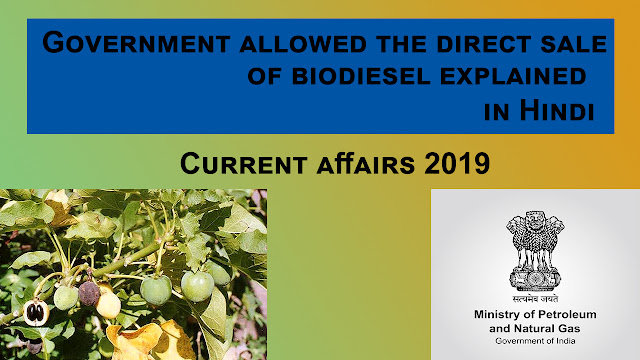Direct Sale of Biodiesel
The Government has allowed the direct sale of biodiesel (B100) for blending with high-speed diesel to all consumers, following the specified blending limits and the standards specified by the Bureau of Indian Standards, with effect from 29th June 2017. For this purpose, “Guidelines for sale of Biodiesel for blending with high-speed diesel for transportation purposes-2019” have been issued vide Notification dated 01.05.2019.
What is Biodiesel?
Biodiesel refers to a vegetable oil- or animal fat-based diesel fuel consisting of long-chain alkyl (methyl, ethyl, or propyl) esters. Biodiesel is typically made by chemically reacting lipids (e.g., vegetable oil, soybean oil, animal fat (tallow) with an alcohol producing fatty acid esters.
Biodiesel is a drop-in biofuel and thus meant to be used in standard diesel engines and is thus distinct from the vegetable and waste oils used to fuel converted diesel engines. Biodiesel can be used alone or blended with petrodiesel in any proportions. Biodiesel blends can also be used as heating oil.
Blends
Blends of biodiesel and conventional hydrocarbon-based diesel are products most commonly distributed for use in the retail diesel fuel marketplace. Much of the world uses a system known as the "B" factor to state the amount of biodiesel in any fuel mix
- 100% biodiesel is referred to as B100
- 20% biodiesel, 80% petrodiesel is labeled B20
- 5% biodiesel, 95% petrodiesel is labeled B5
- 2% biodiesel, 98% petrodiesel is labeled B2
Blends of 20% biodiesel and lower can be used in diesel equipment with no, or only minor modifications, although certain manufacturers do not extend warranty coverage if the equipment is damaged by these blends. The B6 to B20 blends are covered by the ASTM D7467 specification. Biodiesel can also be used in its pure form (B100) but may require certain engine modifications to avoid maintenance and performance problems. Blending B100 with petroleum diesel may be accomplished by
- Mixing in tanks at manufacturing point before delivery to a tanker truck
- Splash mixing in the tanker truck (adding specific percentages of biodiesel and petroleum diesel)
- In-line mixing, two components arrive at tanker trucks simultaneously.
- Metered pump mixing, petroleum diesel, and biodiesel meters are set to X total volume, transfer pump pulls from two points and the mix is complete on leaving the pump.
What is High-Speed Diesel?
Diesel is generally categorized in two parts
1)HSD: High speed diesel
2)LDO: Light diesel oil
Usage:
HSD is normally used in the engine which runs above 750rpm such as in buses, locomotives, trucks, etc.
An LDO is used in below 750 rpm engines. Generally, it is used in steady engines or to burn in the furnace.
The one which we get on petrol pumps/diesel pumps across the nation is HSD.
Again it is classified by various companies as turbo, jet, extra mile, etc
The only difference in those types of diesel is that they just add imported chemicals in regular diesel which signifies its use in the cleaning of injectors, removal of carbon deposits from a cylinder and impart smoothness in the drive.
Who are the Joint ventures?
Bharat Petroleum Corporation Limited (BPCL) and Indian Oil Corporation Limited (IOCL) had entered into Joint Ventures (JVs) / Limited Liability Partnerships (LLPs) to carry out jatropha plantation with the help of Gram Panchayats in Uttar Pradesh. BPCL had formed a Joint Venture (JV) Company named “Bharat Renewable Energy Ltd. (BREL)” which entered into an agreement with the Panchayats to grow Jatropha / Pongamia plantations in their fallow lands. The JV company closed down due to poor yields and high operating costs.
Similarly, IOCL had formed 'Indian Oil Ruchi Biofuels LLP', an LLP firm, to participate in `Jeevan Jyoti Yojana' Project of Government of Uttar Pradesh, for Jatropha plantation by Gram Panchayats on Panchayat wasteland. The LLP facilitated the jatropha plantation in 1818 hectares. IOCL has to exit from LLP since no seeds were made available by Gram Panchayats for biofuel production.
What is the Jatropha plant?
Biofuel development in India centers mainly around the cultivation and processing of Jatropha plant seeds which are very rich in oil (40%). The drivers for this are historic, functional, economic, environmental, moral and political. Jatropha oil has been used in India for several decades as biodiesel for the diesel fuel requirements of remote rural and forest communities; jatropha oil can be used directly after extraction (i.e. without refining) in diesel generators and engines. Jatropha has the potential to provide economic benefits at the local level since under suitable management it has the potential to grow in dry marginal non-agricultural lands, thereby allowing villagers and farmers to leverage non-farm land for income generation. As well, increased Jatropha oil production delivers economic benefits to India on the macroeconomic or national level as it reduces the nation's fossil fuel import bill for diesel production (the main transportation fuel used in the country); minimising the expenditure of India's foreign-currency reserves for fuel allowing India to increase its growing foreign currency reserves (which can be better spent on capital expenditures for industrial inputs and production). And since Jatropha oil is carbon-neutral, large-scale production will improve the country's carbon emissions profile.
Finally, since no food-producing farmland is required for producing this biofuel (unlike corn or sugar cane ethanol, or palm oil diesel), it is considered the most politically and morally acceptable choice among India's current biofuel options; it has no known negative impact on the production of the massive amounts of grains and other vital agriculture goods India produces to meet the food requirements of its massive population (circa 1.1 Billion people as of 2008).
Other biofuels that displace food crops from viable agricultural lands such as corn ethanol or palm biodiesel have caused serious price increases for basic food grains and edible oils in other countries.
video explanation in hindi

Comments
Post a Comment